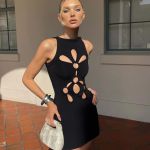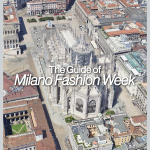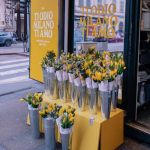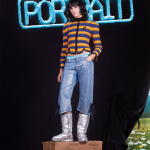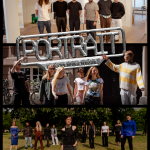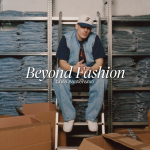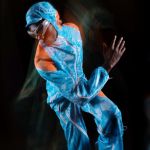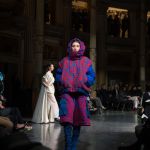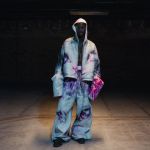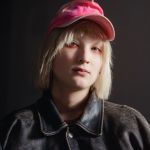
How was the menswear debut of Peter Do
Spoiler: it's a hit
September 14th, 2022
Peter Do is one of those brands that is simply desirable. Whether it's knitwear, pants, shirts or boots hoisted on elegant platforms, the clothes the Vietnamese designer and his team create in New York mix a simplicity as apparent as it is disorienting with a vision that is sophisticated and incisive, but above all highly personal. Already during the brand's early years, dedicated only to womanswear, its passion for flowing draperies, pleated fabrics, and hammered leather as well as geometric lines so pure as to seem abstract had transported Do's creations to the rarefied space where the works of Helmut Lang, Martin Margiela's Hermès, and Phoebe Philo's Cèline - formerly Do's mentor who trained in the British designer's atelier - coexist. It was only a matter of time, then, that these same fluid and classic lines together, so pleasantly deconstructed, would be welcomed by the public as divorced from the separation of genres and that, finally, Peter Do himself would decide to expand his offerings with a menswear line.

That's what happened yesterday during the brand's SS23 show, held in New York City on the 59th floor of the Liberty Building, where signaling the brand's turnaround was K-Pop star Jeno, a member of NCT, who opened the show with a look-symbol of Do's menswear: a satin lapel blazer buttoned at the waist in such a way as to twist and fold the fabric, a thick white cotton shirt underneath, very wide pants with shiny silk pleats with side slits, and very tall boots. Behind the back a triangular cut-out of jacket and shirt whose flaps are held in place, at the base of the back, by a tiny bow that is carried behind a very long strap like a train. Elsewhere there are huge coats with contrasting topstitching, deconstructed sweater-ponchos that fall loosely over the shoulders, sheer tank tops, skirts and sashes, monumental handbags, delicate tie-dyes that mimic the colors of the sky above New York, silky textures, mirror-covered sleeves like romantic studs, leather trench coats and garments made of Tomtex, a plastic-free vegan leather made with waste from the fishing industry.
Already from the first look, so simple on paper but also so theatrical, Do's subtly subversive approach emerges as, in the rest of his menswear designs, he takes traditional and even almost boring elements of men's eveningwear, such as the bib dress shirt, and transforms its structural elements to create something new. Another central element of the men's collection were shirts to close at the bottom and leave completely open at the chest that effectively look like a hybrid between the classic Western costume and a cross-lapelled tunic reminiscent of Vietnamese tradition. Indeed, Peter Do has incorporated Vietnamese suggestions into the fits and proportions of his looks before, and yet the end result of his work yesterday went far beyond citations, references, and debts to the past to produce menswear that, genderless as it may seem, conveys a sense of relevance, absolute modernity, and above all, timeless originality.

The drama implied in the cuts of certain dresses, in the aforementioned theatricality of the train and those almost hidden ornaments, balances so well with the essentiality of the whole that the entire collection conveys a sense of seraphic calm in which the fluidity of a dress, its revealing of details of the male body or its questioning of the parameters of male costume is not a revolutionary gesture but something given, which has always existed and which creates no rupture with anything pre-existing. To a certain extent Peter Do is telling something about our time and society even though, as the show notes say, the theme of the show was the dilation of time due to emotions, a poetic nexus of biographical and philosophical suggestions, inspired yes by the painful death of the designer's father but in which a strange and lucid stillness also reigns. Here is what Do writes:
«The actual dying bit, the crossing over, felt like matrix bullet time or even Zeno’s paradox, it was the time splitting, then splitting, splitting splitting splitting forever and honestly, and this will make me sound old but I thought if the rest of my life felt this infinite I couldn’t tolerate it. I absolutely couldn’t stand it. And then I thought, and this is the bit I wanted to tell you, is that what if we lived here? Right here. How luxurious could that be?[…] I would look into my friends eyes, my family’s eyes, your eyes, my own eyes, and feel so lucky. Maybe not even luck — grace. There’s that thing of how you can’t earn grace. You don’t get less because you’re undeserving and you can’t manipulate it for more. It’s just there infinite but discernible amounts and it carries you a little while when you can’t run anymore.»














